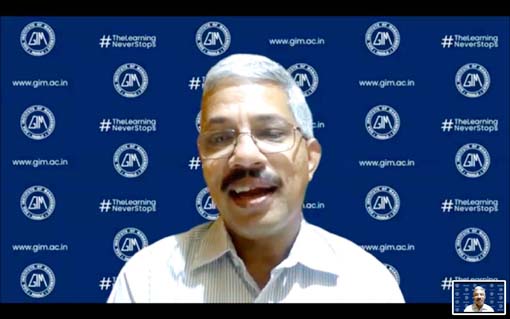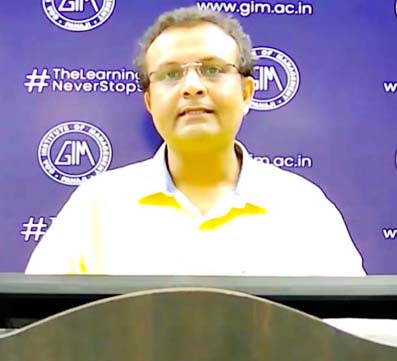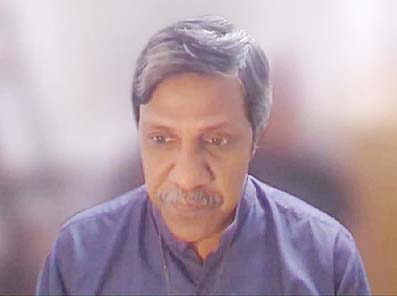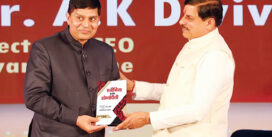- इंदौर एनिमल लिबरेशन की पहल: जानवरों के अधिकारों का हो समर्थन
- सपनों को साकार करने का मंच बन रहा है ‘प्लास्ट पैक 2025’
- शुरू हुआ मध्यभारत का सबसे बड़ा एक्जीबिशन “प्लास्टपैक 2025”, मुख्यमंत्री मोहन यादव ने किया उद्घाटन
- आईडी फ्रेश फूड इंदौर में लेकर आया है ऑथेंटिक साउथ इंडियन इडली डोसा बैटर
- शाओमी इंडिया ने रेडमी 14C 5G को बाज़ार में उतारा और रेडमी नोट 14 5G सीरीज़ के लिए 1000 करोड़ रुपए की शानदार उपलब्धि हासिल की
The pandemic has fast-forwarded technological advancements in higher education say B-school academicians at session organised by GIM

Panaji. Education as we know it, has witnessed a drastic change. The pandemic has accelerated the journey of including the use of technology in the education system and has fast-forwarded the progress in the education sector by five years in a very short span of a few months according to Ajit Parulekar, Director, GIM.
Parulekar was in conversation with academicians on the theme ‘Ed-Tech Essentials for New Normal’, at a recently held webinar organised by the B-school.
The online discussion was an attempt to enable cross border academic deliberations with stakeholders on the adaptation of new technologies in higher education.

Professor Pravat Surya Kar, Associate Professor at GIM moderated the session which also included Professor P. D. Jose, Chair, MOOCs Initiative & Strategy, IIM, Bangalore and Professor Sebastian Morris, Economics, Public Systems, IIM, Ahmedabad.
The speakers agreed that while the capability of amalgamating technology with education had always been there, it was never put to test until now.
Setting the tone for the discussion Ajit Parulekar shared his experience of teaching online and the learning he grasped from the lectures he conducted. “Advantages of online teaching methods include the use of analytics, greater class participation, response statistics and the ease with which pop-quizzes can be conducted” he explained

Professor P. D. Jose of IIM-B, opined that this new reimagined learning will and should continue even after the pandemic ceases to exist. “Learning in the future will be facilitated by technology who will play the role of mediator. Learning centres of the future will not be confined to the classroom and education will be unbundled. Students will be able to learn anywhere and credential driven models will shift towards competency and mastery based models” he said.
Professor Sebastian Morris of IIM-A focussed his thoughts on the challenges and the need to enhance value in the online teaching mode. “It’s easier to communicate online when a prior rapport has been established between a student and a teacher. You know the individual. But when the mode of teaching is purely online, building this rapport becomes difficult for both the parties. It is difficult to gauge body language and assess the non-verbal means of communication” he explained. He also stressed on the fact that there is a need for an unwavering commitment to attention when using this mode.
The discussion witnessed a spectrum of participation from academicians, corporates, students and faculty from across the country. The participants posed questions on digital inclusion and challenges with technology, impact of body language, lack of eye-contact in online classes and stackable learning.


